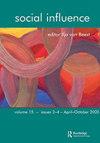元认知与对政治说服的抵抗:来自三波面板研究的证据
IF 0.6
3区 心理学
Q3 PSYCHOLOGY, SOCIAL
引用次数: 2
摘要
研究了2012年美国总统大选中反态度信息暴露后的元认知和抵抗过程的时间进程。采用独特的三波调查面板设计,我们在2012年竞选的最后几个月追踪合格选民,并实验性地操纵了在线平台上针对巴拉克·奥巴马和米特·罗姆尼的负面政治信息的曝光。正如预测的那样,我们发现不参与政治的人(与参与政治的人相比)不太可能反驳攻击他们喜欢的候选人的信息。在竞选过程中,抵制又导致了态度上的确定性、两极分化和与实际投票行为的一致性增加。这些发现首次分析了说服背后的元认知过程对现实世界态度改变和行为的纵向影响。本文章由计算机程序翻译,如有差异,请以英文原文为准。
Meta-cognition and resistance to political persuasion: evidence from a three-wave panel study
ABSTRACT We investigate the temporal course of meta-cognition and resistance processes following exposure to counter-attitudinal information in the 2012 Presidential election. Using a unique 3-wave survey panel design, we tracked eligible voters during the last months of the 2012 campaign and experimentally manipulated exposure to negative political messages targeting Barack Obama and Mitt Romney on an online platform. As predicted, we found that politically unengaged (vs. engaged) individuals were less likely to counter-argue a message attacking their favored candidate. Resistance, in turn, led to increased attitudinal certainty, polarization, and correspondence with actual voting behavior over the course of the campaign. These findings provide the first analysis of the longitudinal effects of meta-cognitive processes underlying persuasion for real-world attitude change and behavior.
求助全文
通过发布文献求助,成功后即可免费获取论文全文。
去求助
来源期刊

Social Influence
PSYCHOLOGY, SOCIAL-
CiteScore
1.50
自引率
0.00%
发文量
4
期刊介绍:
Social Influence is a journal that provides an integrated focus for research into this important, dynamic, and multi-disciplinary field. Topics covered include: conformity, norms, social influence tactics such as norm of reciprocity, authority, scarcity, interpersonal influence, persuasion, power, advertising, mass media effects, political persuasion, propaganda, comparative influence, compliance, minority influence, influence in groups, cultic influence, social movements, social contagions, rumors, resistance to influence, influence across cultures, and the history of influence research.
 求助内容:
求助内容: 应助结果提醒方式:
应助结果提醒方式:


